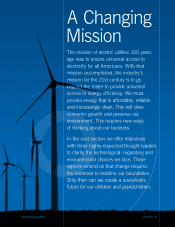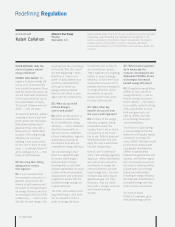Duke Energy 2008 Annual Report Download - page 21
Download and view the complete annual report
Please find page 21 of the 2008 Duke Energy annual report below. You can navigate through the pages in the report by either clicking on the pages listed below, or by using the keyword search tool below to find specific information within the annual report.
2008 Summary Annual Report Duke Energy 19
> > > >
> > > > > >
> > > > > >
> > > >
Energy Services
From 12 one-way meter
information points (monthly
bills) per year to more than
35,000 two-way information
points via “smart meters.”
Real-time data is used by both
customers and Duke Energy
to increase energy efficiency
and better balance supply
and demand with improved
load forecasting.
Fuel
From approximately
70 percent fossil fuels
(regulated generation
megawatt-hours) to
a greater mix of renewable
energy, including wind,
solar and biomass, as
well as nuclear energy
and energy efficiency.
Transmission
From a constrained grid in
parts of our service territory to
a modernized and expanded
grid, with increased capacity
to connect rapidly growing
sources of renewable energy,
especially new wind energy
capacity, to our system.
Distribution
From an unintelligent grid
to a smart grid that enables
improved customer service
and increased energy
efficiency by enabling us
to go beyond the meter.
The grid transitions to
become a two-way informa-
tion network — “an energy
Internet” — as well as an
energy delivery network.
Generation
From mostly fossil and
nuclear plants, to increased
energy efficiency to avoid
building new plants.
Enhanced ability to meet
future customer demand,
with cleaner coal, the
retirement of older fossil
units, distributed generation,
new nuclear capacity and
energy efficiency. Commercial
businesses transition to
being primarily a supplier
of renewable energy.
Redefining
Duke Energy
























